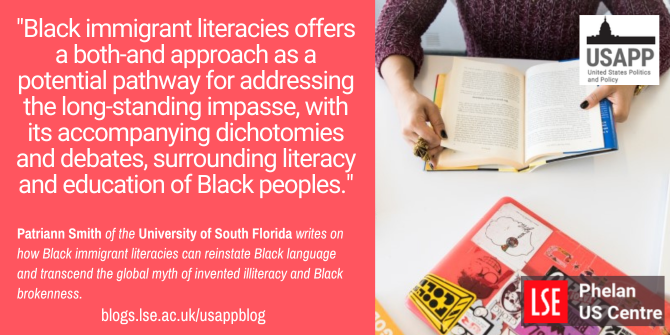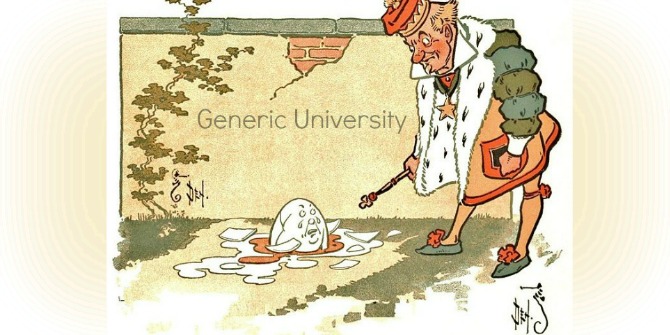 For decades, the Black Majority World has been described by white and Eurocentric institutions as illiterate, with some arguments made that functional literacy for Blacks should be improved while others have instead focused on the literate strengths of Black youth. Patriann Smith counters these views, using a “both-and” approach, arguing that Black people can use literacy exceptionally despite being historically described as broken and deemed in need of support by the systems and societies that have robbed them of the right to functional literacy. Educators and academics, she writes, must make space for the rich linguistic diversity of Black Englishes and Black literacies, which positions Black peoples worldwide to engage with various forms of text, and makes others wonder and excited as well as think in novel ways.
For decades, the Black Majority World has been described by white and Eurocentric institutions as illiterate, with some arguments made that functional literacy for Blacks should be improved while others have instead focused on the literate strengths of Black youth. Patriann Smith counters these views, using a “both-and” approach, arguing that Black people can use literacy exceptionally despite being historically described as broken and deemed in need of support by the systems and societies that have robbed them of the right to functional literacy. Educators and academics, she writes, must make space for the rich linguistic diversity of Black Englishes and Black literacies, which positions Black peoples worldwide to engage with various forms of text, and makes others wonder and excited as well as think in novel ways.
What happens when the Black Majority World is repeatedly described as illiterate? And how has the idea of a globally illiterate Black population functioned as the basis for relentlessly relegating Blackness as broken, as devalued, as a basis for disregard? Even though Black people in spaces such as the United States, Africa, and the Caribbean are often described as illiterate, this depiction is inaccurate as it is often based only on functional literacy as defined by Eurocentric norms and not on what Black people do with literacy every day. While functional literacy is indeed a critical part of any person’s individual literate repertoire, insisting that Black people are illiterate based on literacy tests premised on norms steeped in Whiteness might often be inaccurate. This especially seems to be the case considering the following: Black people worldwide have managed to leverage their unique literate capacities to somehow survive the horrors of slavery, apartheid, and modern-day racism; yet their capacity for using literacies daily based on Afrocentric practice is often significantly overlooked in favor of an emphasis on their functional ‘illiteracies’ guided by Eurocentric norms. This overlooked capacity seems to be especially poignant given the return to hate characterizing US ‘ground-zero’ states such as Florida where a symbolic ban on Blackness and a rigid return to Eurocentric colonial norms appear to threaten democracy even as they tempt the world at large to reimagine a not too recent reality governed by centuries of the horrors of slavery.
Notions of illiteracy
There continues to be a prevailing notion of the illiteracy of Black people in countries such as the US bolstered by the divisive rhetoric of ‘African Americans’ as underperforming even as Black African and Black Caribbean people are positioned as ‘Model Majorities’. Those who advance this rhetoric are adamant that the illiteracy of Black people, a term often used to characterize populations in the Majority World, is a travesty, and one that must be addressed at all costs. They cite statistics such as those advanced by the 2019 report from the National Center for Education Statistics in the US with data from 2012 and 2014 indicating that 23 percent of Black adults in the country reflect low literacy, compared to 35 percent of white adults and 34 percent of Hispanic adults. And they lament statistics such as those from the US Department of Education, National Assessment of Educational Progress (NAEP) that 84 percent of Black students lack proficiency in mathematics and 85 percent of Black students lack proficiency in reading skills. Nuancing this argument, there are those who point out with horror that 72 percent of the world’s illiterates are in Africa even while others observe that a ‘high literate rate’ in the Caribbean has not translated into an educational panacea.
How Black immigrant literacies can capture a global portrait of Black literacy
Proposing solutions, numerous scholars have asked that functional literacy for Blacks be improved while others have urged us to think instead about the literate strengths that Black youth possess. Joining these scholars to bridge the gap across these solutions, I use the framework for Black immigrant literacies to invite a much-needed departure from the long-standing ‘either-or’ approach to Black literacy and call for a ‘both-and’ approach to be adopted instead. With this framework that includes five elements – the struggle for justice, myth of the model minority, a transraciolinguistic approach, local-global connections, and holistic literacies — I ask: “What possibilities exist for using this lens to highlight the literacies that Black people do possess and leverage daily in ways that disrupt the invented illiteracy that has collectively characterized them for centuries?” “How can Black immigrant literacies position Black peoples more accurately using a both-and approach?” “What would positioning Black people using a both-and approach achieve for fully capturing the accurate global literate portrait of Black literacy?”
There is evidence that the promise of a ‘both-and’ as opposed to an ‘either-or’ approach to thinking about Black literacy requires engagement with quantum physics – on multiple levels of reality beyond the dichotomies that assail our current world. By both-and, I mean choosing to see that Black people can be both capable of using literacy exceptionally no matter the language they use while also acknowledging how they are constantly and historically described as broken and deemed in need of support by the very systems and societies that have robbed them of the right to functional literacy. A both-and approach necessitates that metalinguistic, metacultural, and metaracial understanding — elements introduced in transraciolinguistics based on Black immigrant literacies — be used to reflect nuance and open-mindedness, as well as a determination to see Black people and Blackness beyond a Black-White binary.
The rich linguistic diversity of Black Englishes and Black literacies
With regards to exceptional literacy, it is clear that today, many Englishes which have functioned on the peripheries of society for decades, if not centuries, are much more appealing to the emerging generations of all peoples. They understand and crave the transgression of long-standing Eurocentric norms and engage in translanguaging with Black Englishes across borders and online across social spaces in ways that ‘make our eyes pop’ and ‘our souls dance’. Admittedly, African American Englishes have been front and center to this movement for a very long time, co-opted by the Minority and Majority World alike in online and offline spaces but these are largely relegated to the periphery of what we deem formal literate practice in and beyond schools and institutions. Yet, African Americans, and Black peoples worldwide understand that it is their exceptional literate practice steeped in a rich linguistic diversity that positions them to engage with various forms of text, make others wonder and excited and think in novel ways —based on the way they decide to transgressively translanguage with named Englishes and other languages.
There are important indications that our job as teachers, professors, educators, others is not to limit Black readers, writers, literate beings to what we believe should be a literate norm that we wish for them to achieve, Eurocentrically driven or not. We are also not expected to dictate what they should or should not include in their writing and visually representing. Rather, we are called to have Black people see that their linguistic and symbolic repertoires are rich and to help them see with pride what they adeptly do daily with language. They can be taught that while they accessing codes for – learning to read in – various named languages, they can also engage with a sample of the audience they wish to reach with their writing and creating to determine, for instance: “What specific forms of named languages such as the varied Englishes and other languages are most appealing, most impactful, most effective for the audience with which they wish to communicate? How can they access the codes of varied named language systems so that they can have the greatest reach and impact with the messages they hope to convey?”

Photo by Christina @ wocintechchat.com on Unsplash
With regards to functional literacy, it is necessary to understand that Black peoples, like other peoples of Color, are racially entangled with Englishes and that even though these Englishes were used to do bad things, in themselves, there are at the same time, merely abstract representations that have gotten many Black persons into what seem like positions of power. Understanding both the ways in which Englishes can be leveraged for good and for bad matters as this functions in stark opposition to labeling a type of English good or bad in and of itself. This distinction is crucial for acknowledging quantum racialized entanglements of Black Englishes and peoples.
For instance, a Black student whose Englishes are described as deviating from Eurocentric norms in literate practice and who is labeled as bad, would have their personhood ascribed as inferior. Yet, in essence, it is in everyone’s capacity to accept the full range of Black peoples’ linguistic repertoire and not the discarding of parts of it (i.e., Black Englishes), and thus the self, when judging literacy, no matter how intertwined with power these might be. In the end, we – all of us – much like Black peoples, are entangled with Englishes and so we must choose as well as allow Black peoples to choose to use decision-making about Englishes to affirm the full range of Black Englishes and languaging that we, and that our students, and others bring to the table. We must be willing to make space and to create opportunities for what Dr. Ofelia Garcia of the Graduate Center of the City University of New York, Li Wei of UCL, London, and colleagues describe as our full linguistic repertoires to be leveraged in ways that prevent a fragmentation of the self and that reinforce schizophrenic institutional norms.
Institutions often feel challenged by the need to operate on different levels in approaches to Black students
A key finding that has caught my attention in this body of work on Black immigrant literacies is the idea that the vast Minority and Majority World societies, institutions, and schools struggle with this ‘both-and’ approach to Black peoples and to Black students. For instance, teachers wonder about pointing out double negatives in students’ writing, and whether this makes them a gatekeeper or a door-opener. And institutions feel challenged by the need to operate on multiple levels of reality in how we approach Black peoples. Yet, in a simple instance such as discussing double negatives in classrooms, which represents many indications that we consider to be “errors” in certain Black students’ literacies, it is necessary that Black students understand this becomes an ‘error’ and creates a challenge within certain writing systems (i.e., English), only for certain audiences.
Black people often know inherently what they are trying to do with languaging as Black individuals and that they can decide to use double negatives or not, depending on the impact that they wish to have on their audience. This is part of their metalinguistic understanding and their raciosemiotic architecture. They can decide that the double negative allows them to have a power and impact with a Black audience that the other mechanism does not with a White audience. They can decide whether the audience that they are trying to reach will understand what they are trying and how impactfully their message will be received based on whether they decide to use the double negative or not. The idea here is not to reduce Black people’s capacity for literacy to reductive and prescriptive notions such as whether they use double negatives in English speaking or not which are steeped in functional English literacy. Rather, it is to demonstrate to them from the time they enter school, institutions, and society, that they have power to use various syntactic structures across the numerous Englishes and languages they possess for desired communication, effect, and impact.
Perhaps then, the question isn’t: “How can we solve illiteracy for Black peoples in particular or for any peoples in general?” when the premise of this challenge is the direct result of a Eurocentrism determined to obliterate peoples through English languaging and literacy. But rather, it becomes: “How do we present a full and accurate portrait of the exceptional literacy of Black peoples – one that recognizes what they can do when describing what they cannot?” For Black peoples in the new world who all possess generationally inherited literacies developed through racialized entanglements with Englishes as a function of slavery, portraying functional literacies as just one element of their individual literate repertoires, largely based on norms of Englishes and named languages, is critical to disrupting the global myth of broken Blackness. For Black peoples in Africa, Europe, and the Eastern Hemisphere who also possess generationally inherited literacies developed through racialized entanglements with Englishes as a function of apartheid, portraying functional literacies as just one element of their individual literate repertoires, is foundational to dismantling centuries of invented illiteracy that are perpetuated globally.
Black immigrant literacies offers a both-and approach as a potential pathway for addressing the long-standing impasse, with its accompanying dichotomies and debates, surrounding literacy and education of Black peoples. There is value in adopting this approach that offers opportunities to function on multiple levels of reality in ways that equitably acknowledge, while at the same time, Black literacy. It will take nothing short of a distinct disruption in the illiteracy used to characterize Black peoples to reinstate Black language to its rightful place, transcend this global myth of Black brokenness, and restore the legitimacy of Black peoples worldwide.
- This article is based on the new book, Black Immigrant Literacies by Patriann Smith which will be published by Teachers College Press in November, 2023
- Please read our comments policy before commenting.
- Note: This article gives the views of the author, and not the position of USAPP – American Politics and Policy, nor the London School of Economics.
- Shortened URL for this post: https://bit.ly/3qz7HTX






